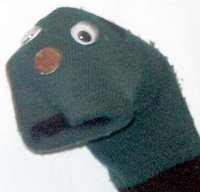Sock puppet
|
|
- For sock puppets on the Internet, see Internet sock puppet.
A sock puppet is a puppet made from a sock, placed over the puppeteer's hand. The sock puppeteer's hand fits into the closed end of the sock, with the thumb forming a jaw, the hand opening and closing to make a "mouth" out of the region between the heel and the toe so the puppet can talk. Minimally the shape of the hand will form an "instant" mouth, but sometimes the mouth is padded by putting in a fairly hard piece of felt (often with a tongue glued inside). Sometimes the region between the toe and heel is cut open with scissors to form a mouth.
The sock is stretched out fully so that it is long enough to cover the puppeteer's wrist. Often, but not always, the puppeteer will hide behind a stand and raise up his or her hand above the stand so that only the puppet is visible. Many sock puppeteers, however, stand in full view along with their puppets and will hold conversations with their own sock puppets, using ventriloquism. Perhaps the best known sock puppeteer was Shari Lewis and her well known puppets Lamb Chop and Charley Horse.
Sock puppets can be made from socks, or stockings, of any color. Worn-out socks may be used, although socks that are too tattered may fall apart during performance, but socks are usually bought brand-new from the store in order to make sock puppets. Various additions can be glued on in order to give your sock a personality. Streamers and felt strings are popularly glued on for hair. Googly eyes (obtained from craft or fabric stores) are glued on for the puppet's eyes.
The process of making sock puppets is popularly taught as a creative activity in elementary schools. Many schools teach children to make sock puppets and then have the children put on shows or plays for the whole school with them, sometimes with all the sock puppets singing.
Sock puppets have many uses. They can be used in often elaborate puppet shows or children's plays, much as marionettes would be used. Sock puppets can also appear, like other puppets, on television shows. They can be used alone on the puppeteer's hand to entertain children, without a complex stage or show. Two orange sock puppets named "Fu" and "Fara" are used in teaching German children how to read. People also make and display sock puppets for their own artistic value.
Sock puppets have also appeared in advertising. During the late 1990s, the ecommerce company Pets.com used a "spokespuppet" along with the tagline "because pets can't drive" in its advertising to much critical acclaim. But while the puppet became a pop culture icon, it did not help the company sell enough product to survive the dot-com crash.[1] (http://www.internetworld.com/magazine.php?inc=121500/12.15.00fastforward2.html)
Because sock puppets appear friendly, non-threatening, and clearly non-human, therapists often have their patients speak to a sock puppet when they feel inhibited from speaking to the therapist. For the same reasons, and because oneself and one's sock puppet often feel like two different persons, one can speak through a sock puppet to express thoughts or facets of one's personality that one would not feel free to admit in person or fears would harm one's reputation were they actually said in one's own person. Mr. Garrison's use of Mr. Hat on South Park is a good example of this. Conversely, the American professional wrestler Mick Foley has used a sock puppet called Mr Socko as one of his signature weapons.
In the 1993 movie Freaked, Bobcat Goldthwait plays Sockhead, a character who is a talking sock puppet.
The late 90's MTV sock puppet show, Sifl and Olly, ran for 2 years and grew a cult following.

